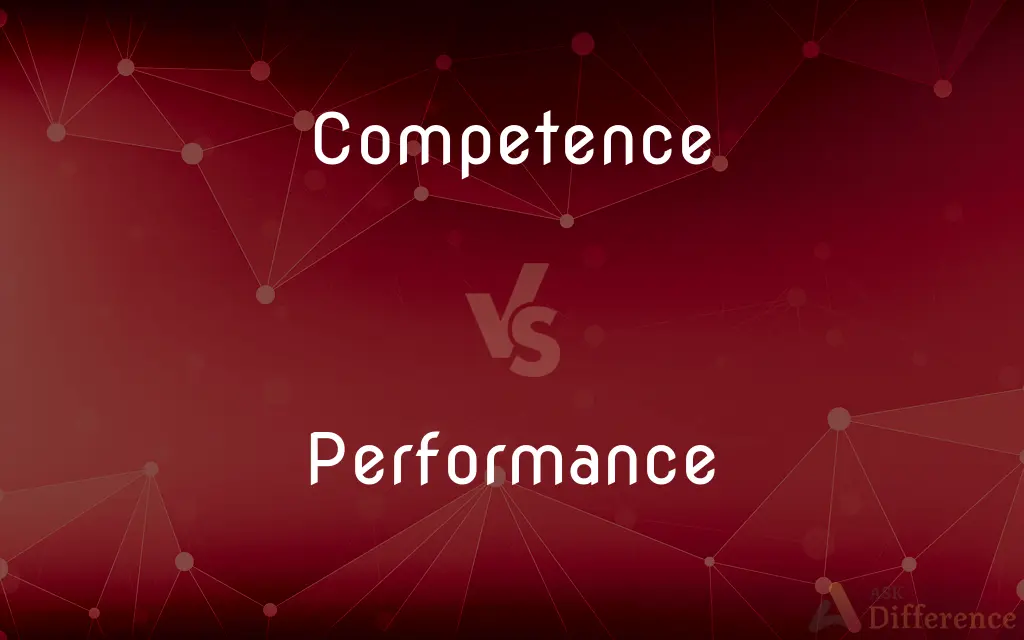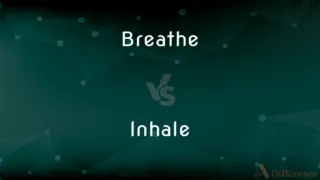Competence vs. Performance — What's the Difference?
By Tayyaba Rehman & Fiza Rafique — Updated on March 24, 2024
Competence involves the underlying knowledge and ability for language use, while performance is the actual use of language in real situations.

Difference Between Competence and Performance
Table of Contents
ADVERTISEMENT
Key Differences
Competence refers to an individual's innate capacity and theoretical knowledge to understand and use language, including grammar, vocabulary, and syntax. It encompasses what a person knows about a language, regardless of whether it is being used. On the other hand, performance is about how this knowledge is applied in real-world communication. It reflects the actual production and comprehension of language, influenced by various factors like stress or distractions.
While competence is a stable, internal aspect of language knowledge that does not change frequently, performance can vary significantly from moment to moment. For example, someone might know the rules of grammar (competence) but still make mistakes when speaking quickly or under pressure (performance). Performance is thus more variable and situation-dependent.
Competence is a theoretical construct that linguists use to describe the ideal speaker-hearer's knowledge of their language. It is a model that helps in understanding how language acquisition occurs and what constitutes linguistic knowledge. Performance, in contrast, is observable and measurable through speech, writing, or sign language. It provides data for linguistic analysis but can include errors and deviations from the normative grammar.
In education and assessment, competence is often measured indirectly through various methods designed to infer a learner's knowledge of the language, such as standardized tests. Performance, however, is evaluated directly through practical tests, oral exams, or portfolio assessments, showcasing the learner's ability to use language in context.
Competence includes a person's potential for learning and using new aspects of language, suggesting a capacity for language growth and development. Performance showcases the current level of language use, including both proficiency and the influence of external factors on language production.
ADVERTISEMENT
Comparison Chart
Definition
Theoretical knowledge of language (grammar, vocabulary).
Actual use of language in communication.
Stability
Stable and reflects innate ability.
Variable, influenced by context and conditions.
Observability
Not directly observable; inferred from language use.
Directly observable through speech or writing.
Role in Linguistics
Helps understand language acquisition and knowledge.
Provides data for analysis of language use.
Assessment
Measured indirectly through tests of language knowledge.
Evaluated through practical language use tests.
Compare with Definitions
Competence
Knowledge of language structure and function.
Understanding why questions typically begin with a 'wh-' word.
Performance
Application of language rules in real situations.
Correctly applying tense rules while telling a story.
Competence
Understanding the rules of a language.
Knowing that I goes is incorrect, but I go is correct.
Performance
Actual use of language in speaking or writing.
Delivering a speech or writing an essay.
Competence
Capacity to produce and interpret sentences.
Recognizing both The cat chased the mouse and The mouse was chased by the cat as grammatically correct.
Performance
Influenced by psychological and environmental factors.
Stuttering under stress despite knowing the correct words.
Competence
Innate language ability, regardless of external factors.
A speaker's knowledge of subtle nuances between synonyms.
Performance
Observable language behavior, including errors.
Making a grammatical mistake during a conversation due to nervousness.
Competence
Theoretical aspect of language skills.
Understanding complex grammatical structures without necessarily using them in daily conversation.
Performance
Practical aspect of language skills.
Engaging in fluent conversation using familiar phrases and expressions.
Competence
The ability to do something well or efficiently.
Performance
A performance is an act of staging or presenting a play, concert, or other form of entertainment. It is also defined as the action or process of carrying out or accomplishing an action, task, or function.
Competence
A range of skill or ability
A task beyond his competence.
Performance
The act of performing or the state of being performed.
Competence
A specific ability or skill
A surprising competence in dealing with animals.
Performance
The act or style of performing a work or role before an audience.
Competence
(Law) The quality or condition of being legally qualified or fit to perform an act.
Performance
The way in which someone or something functions
The pilot rated the airplane's performance in high winds.
Competence
(Microbiology) The ability of bacteria to be genetically transformable.
Performance
A presentation, especially a theatrical one, before an audience.
Competence
(Medicine) The ability to respond immunologically to bacteria, viruses, or other antigenic agents.
Performance
Something performed; an accomplishment.
Competence
(Linguistics) The knowledge that enables one to speak and understand a language.
Performance
(Linguistics) One's actual use of language in actual situations.
Competence
Sufficient means for a comfortable existence.
Performance
The act of performing; carrying into execution or action; execution; achievement; accomplishment; representation by action.
The performance of an undertaking or a duty
Though the result wasn't what we were hoping for, I have to commend the performance of the team, never giving up until the end.
Competence
(uncountable) The quality or state of being competent, i.e. able or suitable for a general role.
Performance
That which is performed or accomplished; a thing done or carried through; an achievement; a deed; an act; a feat; especially, an action of an elaborate or public character.
Competence
(countable) The quality or state of being able or suitable for a particular task; the quality or state of being competent for a particular task or skill.
Performance
(arts) A live show or concert.
The band played a mix of old and new songs during their 90-minute performance.
We saw the whole ballet performance from the front row.
Competence
(linguistics) The system of linguistic knowledge possessed by native speakers of a language, as opposed to its actual use in concrete situations (performance), cf. linguistic competence.
Performance
The amount of useful work accomplished estimated in terms of time needed, resources used, etc.
Better performance means more work accomplished in shorter time and/or using fewer resources.
Competence
(dated) A sustainable income.
Performance
(linguistics) The actual use of language in concrete situations by native speakers of a language, as opposed to the system of linguistic knowledge they possess (competence), cf. linguistic performance.
Competence
The legal authority to deal with a matter.
Performance
The act of performing; the carrying into execution or action; execution; achievement; accomplishment; representation by action; as, the performance of an undertaking of a duty.
Promises are not binding where the performance is impossible.
Competence
(geology) The degree to which a rock is resistant to deformation or flow.
Performance
That which is performed or accomplished; a thing done or carried through; an achievement; a deed; an act; a feat; esp., an action of an elaborate or public character.
Competence
The state of being competent; fitness; ability; adequacy; power.
The loan demonstrates, in regard to instrumental resources, the competency of this kingdom to the assertion of the common cause.
To make them act zealously is not in the competence of law.
Performance
A dramatic or musical entertainment;
They listened to ten different performances
The play ran for 100 performances
The frequent performances of the symphony testify to its popularity
Competence
Property or means sufficient for the necessaries and conveniences of life; sufficiency without excess.
Reason's whole pleasure, all the joys of sense,Lie in three words - health, peace, and competence.
Superfluity comes sooner by white hairs, but competency lives longer.
Performance
The act of performing; of doing something successfully; using knowledge as distinguished from merely possessing it;
They criticised his performance as mayor
Experience generally improves performance
Competence
Legal capacity or qualifications; fitness; as, the competency of a witness or of a evidence.
Performance
The act of presenting a play or a piece of music or other entertainment;
We congratulated him on his performance at the rehearsal
An inspired performance of Mozart's C minor concerto
Competence
The quality of being adequately or well qualified physically and intellectually, especially possession of the skill and knowledge required (for a task).
Performance
Process or manner of functioning or operating;
The power of its engine determine its operation
The plane's operation in high winds
They compared the cooking performance of each oven
The jet's performance conformed to high standards
Competence
The quality of being adequately or well qualified physically and intellectually
Performance
Any recognized accomplishment;
They admired his performance under stress
When Roger Maris powered four home runs in one game his performance merits awe
Common Curiosities
How does performance differ from competence in language use?
Performance is the actual use of language in real situations, reflecting how well someone applies their linguistic competence.
What is linguistic competence?
Linguistic competence is the theoretical knowledge of language, including grammar and vocabulary, that a person has.
How do linguists measure competence?
Linguists infer competence through tests and analyses that gauge a person's understanding of language rules and structures.
Can performance improve over time?
Yes, with practice and exposure, performance in a language can significantly improve.
Do errors in speaking or writing always indicate a lack of competence?
No, errors in performance can occur due to external factors, even if the speaker has high competence.
Why is performance variable in different situations?
Performance varies due to changing external conditions and the speaker's physical and emotional state.
Can competence be directly observed?
Competence itself cannot be directly observed; it is inferred from performance and understanding of language.
Can someone have high competence but low performance?
Yes, factors like anxiety or distractions can cause someone with high linguistic competence to perform poorly in certain situations.
What factors influence language performance?
Performance can be influenced by physical and psychological factors, such as fatigue, stress, or the presence of an audience.
How important is competence in learning a new language?
Competence is crucial as it represents the underlying knowledge necessary for learning and using a new language effectively.
Is there a perfect state of competence and performance?
No, as both competence and performance are subject to growth, change, and influence by various factors.
Is competence static or dynamic?
Competence is relatively stable but can expand with learning and exposure to language.
How does performance provide insight into linguistic competence?
Analyzing performance errors and patterns can help linguists understand the nature of linguistic competence.
How do educators assess competence and performance?
Competence is assessed indirectly through theoretical tests, while performance is assessed directly through practical language use.
What role does competence play in language acquisition?
Competence is the goal of language acquisition, representing the learner's target knowledge.
Share Your Discovery

Previous Comparison
Breathe vs. Inhale
Next Comparison
Contig vs. ScaffoldAuthor Spotlight
Written by
Tayyaba RehmanTayyaba Rehman is a distinguished writer, currently serving as a primary contributor to askdifference.com. As a researcher in semantics and etymology, Tayyaba's passion for the complexity of languages and their distinctions has found a perfect home on the platform. Tayyaba delves into the intricacies of language, distinguishing between commonly confused words and phrases, thereby providing clarity for readers worldwide.
Co-written by
Fiza RafiqueFiza Rafique is a skilled content writer at AskDifference.com, where she meticulously refines and enhances written pieces. Drawing from her vast editorial expertise, Fiza ensures clarity, accuracy, and precision in every article. Passionate about language, she continually seeks to elevate the quality of content for readers worldwide.














































